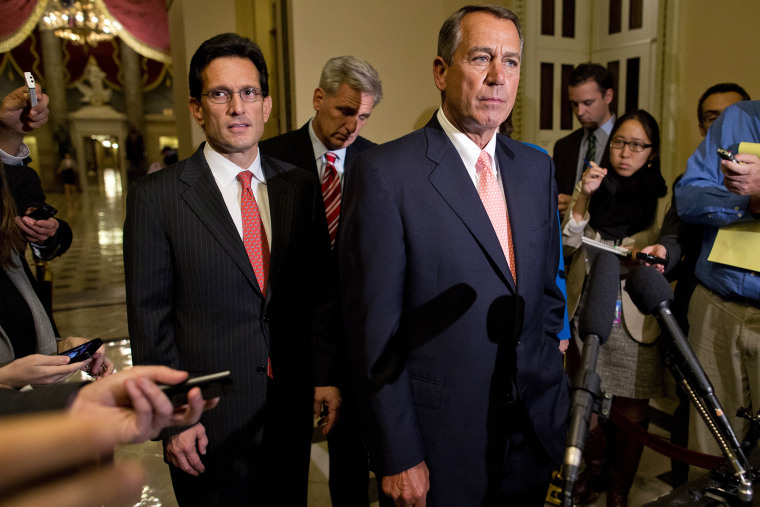Conservative opposition to Obamacare has always been fueled by comically bad faith, starting with the GOP’s initial, nakedly partisan disavowal of the plan. (To review: Obamacare was previously hatched by the conservative Heritage Foundation, embraced by President George H.W. Bush and Republican congressional leaders, and implemented at the state level by the guy who later won the GOP’s 2012 presidential nomination.) Yet Democrats, including the White House, continue to make the mistake of taking the right’s knocks on Obamacare seriously. The latest example concerns the issue of delay.
Granted, President Obama and congressional Democrats steadfastly refused to delay implementation of the entire Affordable Care Act when congressional Republicans, ludicrously, tried to make doing so a condition of keeping the government open and raising the debt ceiling. But after conservatives started hollering about the Obamacare-mandated cancellation of often-cheap but substandard health policies in the individual market, Obama — under pressure from panic-stricken congressional Democrats (and former President Bill Clinton) — allowed these substandard policies to be extended for one year.
Did the right express relief that bait-and-switch capitalism—in this instance, health insurers’ untrammelled right to sucker buyers into purchasing policies with ludicrously high deductibles and other glaring deficiencies—would live to fight another day? Of course it didn’t. Instead, it protested that Obama’s concession to GOP demagoguery violated the Constitution. Like Charlie Brown, the president let Lucy talk him into kicking at a football that he knew she would snatch away, landing him flat on his back.
“The implementation date is an explicit requirement of the law,” Scott A. Coffina, a former assistant U.S. attorney under President George W. Bush, complains in National Review Online. “The president’s order violates that requirement.” The Weekly Standard’s Daniel Halper writes: “Obama's proposal is an extra-legal solution to a big problem for millions of Americans around the country.”
Actually, it was never a “big problem,” except insofar as the botched rollout of HealthCare.gov has made it temporarily difficult for people to go online and purchase replacement policies on the federal exchange. And Obama’s solution creates needless, potentially expensive complications. But lets take at face value Halper’s claim that government-mandated cancellation of substandard policies was a big problem. Why is he so eager to find fault with Democratic appeasement? Because, Halper explains (quoting Sen. Ted Cruz), "We cannot 'fix' Obamacare.”
What Halper and Cruz really mean is that they don’t want to “fix” Obamacare. They just want to repeal it. Ergo, any effort to answer any of their criticisms is pretty much guaranteed to infuriate them. It was much the same this past July when, even as conservatives claimed the imminent implementation of Obamacare’s “employer mandate” was killing jobs, they insisted the president’s decision to delay it by one year was similarly unconstitutional.
Does the executive branch have the constitutional power to delay implementation of a statute? Of course it does. Federal agencies blow such deadlines all the time. If some stakeholder finds the delay intolerable, he or she can take the agency in question to court and perhaps get a judge to impose a stricter timetable. (Environmental groups do this a lot.)
The “Volcker Rule” restricting trading by banks, which was mandated by 2010’s Dodd-Frank financial reform bill, was required under that statute to be issued two years ago. But you don’t hear National Review and the Weekly Standard crying about that. Most of the time, conservatives are only too happy to see delay in the implementation of new statutory requirements that affect business. The longer the delay, the better shot business lobbyists have at watering down the regulation. Only with Obamacare do conservatives pretend to find such accommodation unconstitutional.
Why? Because accommodation isn’t really what the right seeks. It wants to kill Obamacare. This isn’t exactly a secret. So why do Democrats keep accommodating it?
